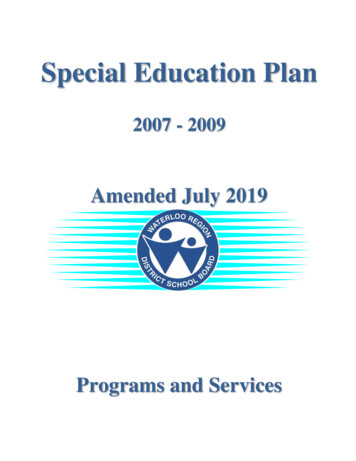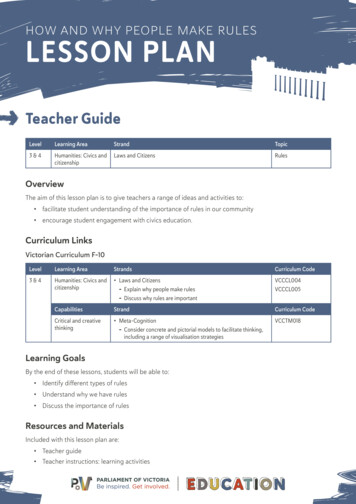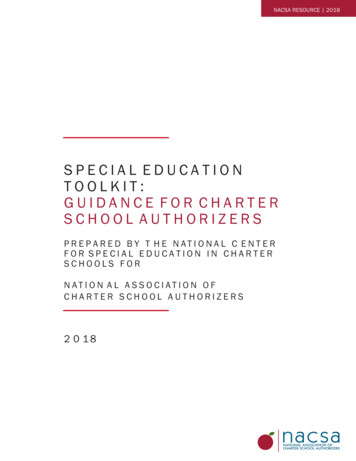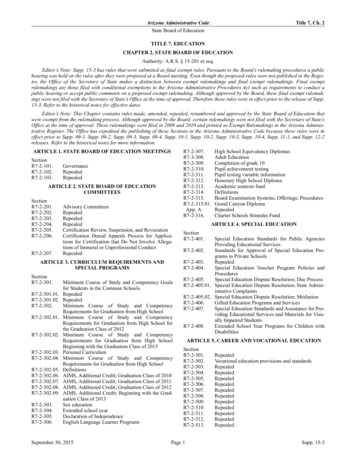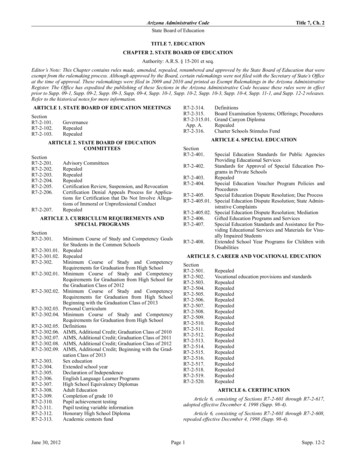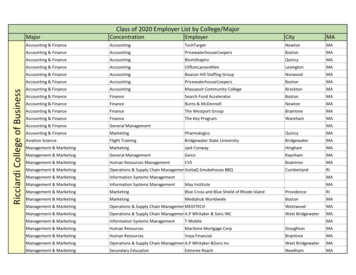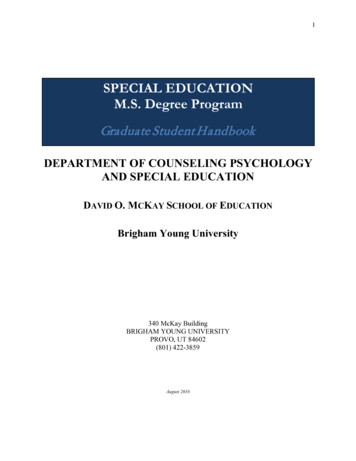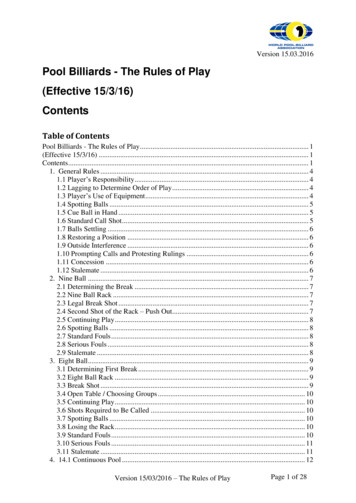
Transcription
SPECIAL EDUCATION SERVICESSUPP. NO. 04-4CH. 290-8-9RULES OF THE ALABAMA STATE BOARD OF EDUCATIONSTATE DEPARTMENT OF EDUCATIONCHAPTER 290-8-9SPECIAL EDUCATION SERVICESTABLE OF CONTENTS290-8-9-.01 Child Identification .490(1) Child Find .490(2) Prereferral Intervention Strategies in the Regular Class .490(3) Referral .490290-8-9-.02 Evaluations .491.01(1) Evaluation Requirements. .491.01(2) Individual Intellectual Evaluations .493(3) Independent Educational Evaluations .494(4) Out-of-State Evaluations .495(5) Reevaluation .495(6) Length of Time Evaluations are Valid for Initial Eligibility .496(7) State and District-Wide Assessments .496290-8-9-.03 Definitions and Minimum Evaluation Criteria to Determine .496Eligibility(1) Autism .497(2) Deaf-Blindness .498(3) Developmental Delay.498(4) Emotional Disturbance.499(5) Hearing Impairment .501(6) Mental Retardation.501(7) Multiple Disabilities.502(8) Orthopedic Impairment .502(9) Other Health Impairment .503(10) Specific Learning Disabilities .504(11) Speech and Language Impairment .505(12) Traumatic Brain Injury .507(13) Visual Impairment .507290-8-9-.04 Eligibility.508(1) Procedures for Determining Eligibility .508(2) Written Report .509(3) Age Requirements .510(4) Eligibility for Services .510485
SUPP. NO. 04-4SPECIAL EDUCATION SERVICES290-8-9-.05 Individualized Education Program (IEP) .510(1) Effective Dates for IEPs.511(2) IEP Team Membership .511(3) IEP Content .512(4) Access to IEPs.514(5) Extended School Year Services (ESY) .514(6) Interim IEPs .515(7) IEPs for Children with Disabilities Placed in Private Schools byLocal Education Agencies .515(8) IEP Accountability .516(9) Parental Involvement in IEP Development.516(10) IEP Review .517(11) Exceptions to IEP Requirements for Incarcerated Individuals with Disabilities .518(12) Agency Responsibilities for Transition .518(13) Tape Recording IEP Meetings .519290-8-9-.06 Least Restrictive Environment (LRE) .519(1) LRE Determination .519(2) Nonacademic Settings .520(3) LRE Continuum .520(4) Justification for Least Restrictive Environment .522290-8-9-.07 Other Educational Services and Programs .522(1) Career/Technical Education .523(2) Physical Education .523(3) Extracurricular Activity Participation .523(4) Proper Functioning of Hearing Aids .524(5) Related Services .524(6) Assistive Technology .524(7) Transportation for Children with Disabilities .525290-8-9-.08 Procedural Safeguards .526(1) Surrogate Parent .526(2) Records .528(3) Rights for Children .532(4) Parental Notice and Consent .532(5) Meetings .533(6) Special Education Rights .534(7) Content of Special Education Rights .534486
SUPP. NO. 04-4SPECIAL EDUCATION SERVICES(8)Due Process .535Complaints .535Mediation .537Due Process Hearing .538(9) Transfer of Parental Rights at Age of Majority (19).546(10) Withholding of Funds .546(11) Resolution of Agency Complaints Against SEA .547290-8-9-.09 Discipline Procedures .547(1) Free Appropriate Public Education (FAPE) for Children Suspendedor Expelled from School. .547(2) Change of Placement .548(3) Authority of School Personnel .548(4) Authority of Hearing Officer .549(5) Determination of Setting .550(6) Manifestation Determination Review .550(7) Determination That Behavior Was Not Manifestation of Disability .551(8) Parent Appeal .552(9) Placement During Appeals .552(10) Protections for Children Not Yet Eligible for Special Education andRelated Services .553(11) Expedited Due Process Hearings .554(12) Referral to and Action by Law Enforcement and Judicial Authorities .554(13) Bus Suspension .554(14) In-School Suspension.555290-8-9-.10 Administration .555(1) Residency .555(2) School Psychometrist .556(3) Forms .556(4) Education Agency Plan .556(5) Program Review.556(6) Children in Private Schools Placed by Parents if FAPE is an Issue .556(7) Children with Disabilities Enrolled by Parents in Private Schools Within .557the Education Agency's Jurisdiction(8) Graduation Activities and Diplomas .559(9) Requirements for the Alabama Occupational Diploma .560(10) Reports .562290-8-9-.11 Definitions .562(1) Annual Goals .562(2) At No Cost To Parents .563487
SUPP. NO. PECIAL EDUCATION SERVICESAudiology .563Authority of Hearing Officer .563Benchmarks.563Consent .563Controlled Substance .563Counseling Services .564Critical Skills .564Day .564Destruction .564Dual Enrollment .564Early Identification and Assessment of Disabilities in Children .564Education Records .564Evaluation .565Extended School Year.565Free Appropriate Public Education (FAPE) .565General Curriculum .565Illegal Drug .565Individualized Education Program .565Include.565Medial Services .565Native Language .565Occupational Therapy .566Orientation and Mobility Services .566Other State Agency .566Parent .566Parent Counseling and Training.566Participating Agency.567Personally Identifiable .567Physical Education .567Physical Therapy.567Present Level of Performance .567Private Agency .567Psychological Services.567Public Agency .567Qualified Personnel .568Recreation .568Rehabilitation Counseling .568School Health Services .568488
SUPP. NO. L EDUCATION SERVICESSocial Work Services in Schools .568Special Education.568Specially Designed Instruction .569Speech-Language Pathology Services .569Supplementary Aids and Services .569Substantial Evidence .569Transition Services.569Travel Training .570Vocational Education .570Weapon .570290-8-9-.12 Exception to Ala. Admin. Code r. 290-8-9-.03 (10) .570(1) Definition .570(2) Eligibility Criteria .571(3) Evaluations Required .572290-8-9-.13 Case Manager for Students with Disabilities .572(1) Case Manager.572(2) Number of Records Per Teacher .573(3) State Monitoring of Case Manager Role .573(4) Service Delivery.573290-8-9-.14 Gifted .573(1) Definition .573(2) Referral .573(3) Consent .574(4) Evaluation .574(5) Eligibility Determination .575(6) Gifted Education Plan .575(7) Placement .576(8) Administration .576(9) Caseload .577(10) Procedural Safeguards .577290-8-9-.15 Exception to Ala. Admin. Code r. 290-8-9-.03(6) .578(1) Definition .578(2) Evaluations Required .578489
SUPP. NO. 01-3SPECIAL EDUCATION SERVICES290-8-9-.01290-8-9-.01(3)(a)290-8-9-.01 Child Identification.(1) Child Find.(a) Education agencies serving children with disabilities must develop andimplement procedures that ensure that all children within their jurisdiction, birth totwenty-one, regardless of the severity of their disability, and who need special educationand related services are identified, located, and evaluated. Child Find applies to childrenwho attend private schools, including children attending religious schools, within theeducation agency's jurisdiction, highly mobile children with disabilities (i.e. migrant andhomeless children), and children who are suspected of having a disability and are in needof special education even though they are advancing from grade to grade. Child Findalso includes a practical method of determining that children are currently receivingneeded special education and related services.(b) Education agencies must participate in a transition planning conferencearranged by the designated lead agency for children who participated in early interventionprograms. In order to experience a smooth and effective transition to preschool programs ina manner consistent with section 637 (a) (8) of the Act, education agencies must haveprocedures describing the transition planning conference process included in theEducation Agency Plan.(c) Education agencies are required to make a free appropriate public education(FAPE) available to each eligible child residing in their jurisdiction no later than thechild's third birthday; and have an IEP in effect for the child by that date in accordancewith Ala. Admin. Code r. 290-8-9-.01 through -.05. If the child's third birthday falls duringthe summer months, the IEP Team will determine when special education services begin.(2) Prereferral Intervention Strategies in the General Education Class.Before a child is referred for special education services, prereferral intervention strategiesmust be implemented in the general education program and monitored by the BuildingBased Student Support Team (BBSST) or other designated staff for at least six weeks orlonger, depending on the problem and be determined unsuccessful. Any child referredDecember 1, 2000, and after must have a prereferral form and functional assessment ofthe classroom environment completed for every referral even if the education agency isnot currently implementing the Building Based Student Support Team model. This rulemay be waived for a child who has severe problems that require immediate attention, forthree- and four-year olds, for five-year olds who have not been in kindergarten, for childrenwith articulation, voice, or fluency problems only, for children with a medical diagnosis oftraumatic brain injury, and for a child who has been referred by his/her parents.(3) Referral. Education agencies must develop and implement proceduresregarding the processing of referrals for special education evaluations.(a) The referral form must be completed each and every time a student issuspected of having a disability. The referral-to-placement process begins with the datethat the education agency receives a written referral and must be completed within ninetycalendar days regardless of any scheduled interruptions in the scholastic year or thescheduled summer vacation.490
SUPP. NO. 00-4SPECIAL EDUCATION SERVICES290-8-9-.01(3)(b)290-8-9-.01(3)(g)(b) For a parent who is unable to complete a written referral, the educationagency must obtain information from that parent and complete the written referral.(c) Education agencies may not limit referrals by the number per year or thetime of year that referrals are accepted.(d) As part of the referral process, information must be gathered as part of thereferral to determine if there are any environmental, cultural, language, or economicdifferences that might mask a student's true abilities and thereby affect the student'sperformance in the areas evaluated. Tests and evaluative materials selected andadministered should be sensitive to environmental, cultural, linguistic, and economicdifferences.(e) The IEP Team must review the referral and determine if the child will beevaluated for special education services. If the IEP Team determines that the childshould not be evaluated for special education services, written notice, that meets therequirements in Ala. Admin. Code r. 290-8-9-.08(4)(b), must be given to parents. If theIEP Team determines that the child should be evaluated for special education services,the consent requirements in Ala. Admin. Code r. 290-8-9-.08(4)(a), must be followed. Inaddition to obtaining consent, for children suspected of being eligible for services in thearea of mental retardation, when the parent participates in the IEP meeting to discuss thereferral, a home version of the adaptive behavior assessment must be completed by theparent/guardian at that time. The parent/guardian may complete the scale or if it is aninterview version, it must be completed by conducting a parental interview. If theparent/guardian does not attend the IEP meeting to discuss the referral, a home version ofthe adaptive behavior assessment must be sent home. If the adaptive behavior instrumentis in the form of an interview, it may be sent home, but must be completed by schoolpersonnel in conjunction with the parents by telephone, home visit, or other mutuallyagreed upon arrangements. The local education agency must make at least two attempts,and document such attempts, to have the parent/guardian complete the home version ofthe adaptive behavior assessment within the 60-day referral to eligibility process.However, the absence of a home version of the adaptive behavior assessment may notdelay the 60-day referral to eligibility process. The school version and the home versionof the adaptive behavior assessment must be conducted using the same test instrument.(f) If the child is evaluated, a qualified team, including the parent, has sixtycalendar days from the date of the receipt of the referral to determine eligibility forspecial education services.(g) If a child is eligible for special education services, the IEP Team has thirtydays from the date of eligibility determination to develop an IEP.491
SUPP. NO. 01-3SPECIAL EDUCATION SERVICES290-8-9-.02290-8-9-.02(1)(c)Author: Ed RichardsonStatutory Authority: Ala. Code Title 16, Chapter 39; 20 U.S.C. 1412 - 1414; 34 CFR §300.121(c), 125, 132,343(b)(2), 451, 533.History: Amended 8-12-80; repealed 4-10-86, new 4-10-86 effective 5-30-86; 12-13-90 deleted and reserved 290-8-9.02(5) effective 1-21-91; 8-8-91 adopted 290-8-9-.02-.45ER effective 8-8-91; 10-10-91 adopted ER as regular ruleeffective 11-19-91; repealed 6-10-93, new 6-10-93 effective 8-1-93; repealed 7-13-99, new 7-13-99 adopted 290-8-9.01-.58ER effective 7-13-99; adopted ER as regular rule effective 10-14-99; adopted as ER effective 10-12-00; adoptedER as regular rule effective 1-18-01; adopted 290-8-9-.01(1)(b)-.73ER effective 6-14-01; adopted ER as regular ruleeffective 9-13-01.290-8-9-.02 Evaluations. Education agencies must develop and implement proceduresto evaluate those children suspected of having a disability that adversely affects theireducational performance and who may need specially designed instruction.(1) Evaluation Requirements. If the IEP Team determines that the childshould be evaluated, the evaluation must be conducted as follows:(a) Before an initial evaluation can be conducted, the education agency mustobtain written consent as required by the Ala. Admin. Code r. 290-8-9-.08(4)(a). Ifconsent for evaluation is refused, the education agency may pursue an evaluation throughmediation and/or due process. Mediation and due process procedures are described atAla. Admin. Code r. 290-8-9-.08(8)(b)(c).(b) Before the initial provision of special education and related services, a fulland individual evaluation of the child’s educational needs must be conducted.(c) As part of an initial evaluation and as part of all required reevaluations, theIEP Team and other qualified professionals, as appropriate, must:491.01
SUPP. NO. 00-4SPECIAL EDUCATION ew existing evaluation data on the child, including evaluations andinformation provided by the parents of the child, current classroom-based assessmentsand observations, and observations by teachers and related services providers, and2.On the basis of the review of existing evaluation data and input from thechild’s parents, identify what additional data, if any, are needed to determine:(i) Whether the child has a disability, or, in the case of a reevaluation of a child,whether the child continues to have a disability;(ii) The present levels of performance and educational needs of the child;(iii) Whether the child needs special education and related services, or in thecase of a reevaluation of a child, whether the child continues to need special educationand related services; and(iv) Whether any additions or modifications to the special education and relatedservices are needed to enable the child to meet the measurable annual goals set out in
special education services supp. no. 04-4 ch. 290-8-9 rules of the alabama state board of education state department of education chapter 290-8-9 special education services table of contents 290-8-9-.01 child identification .
